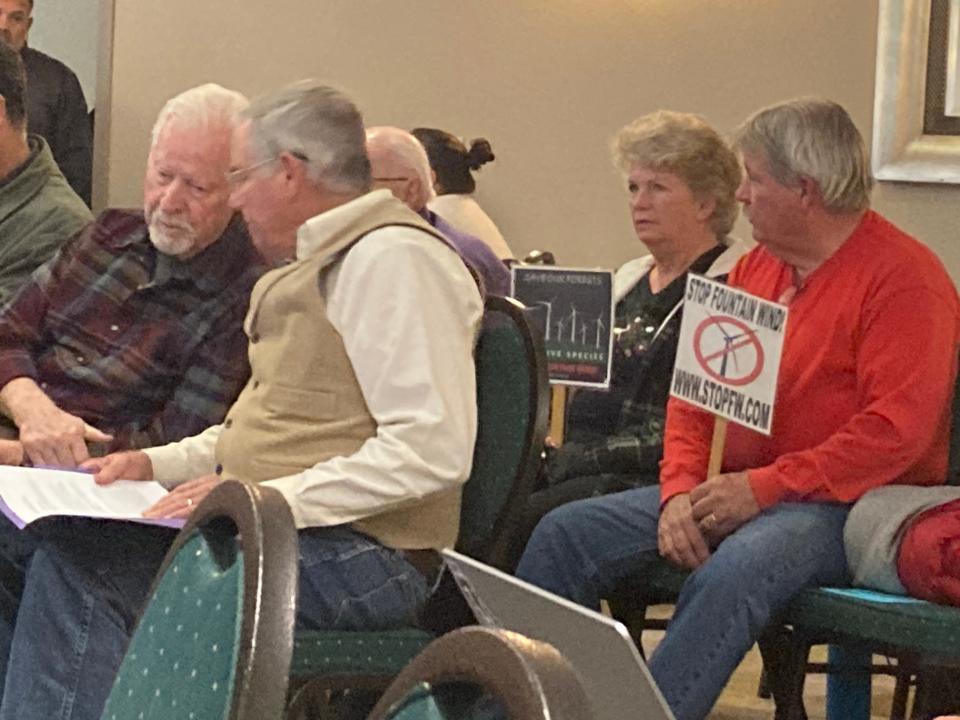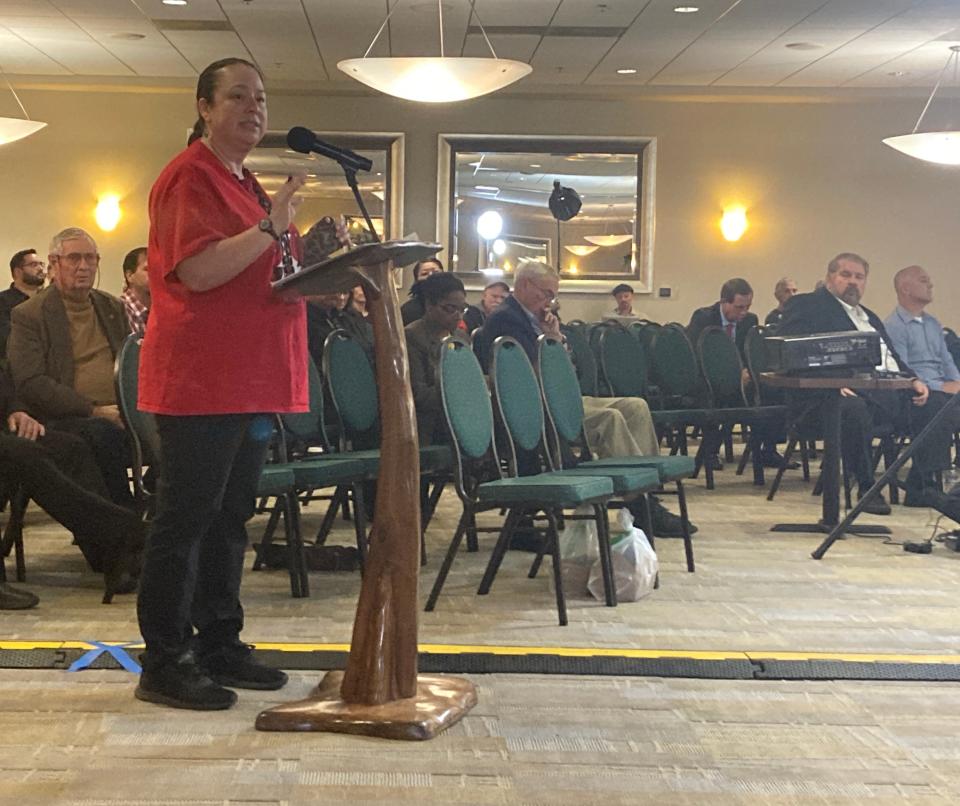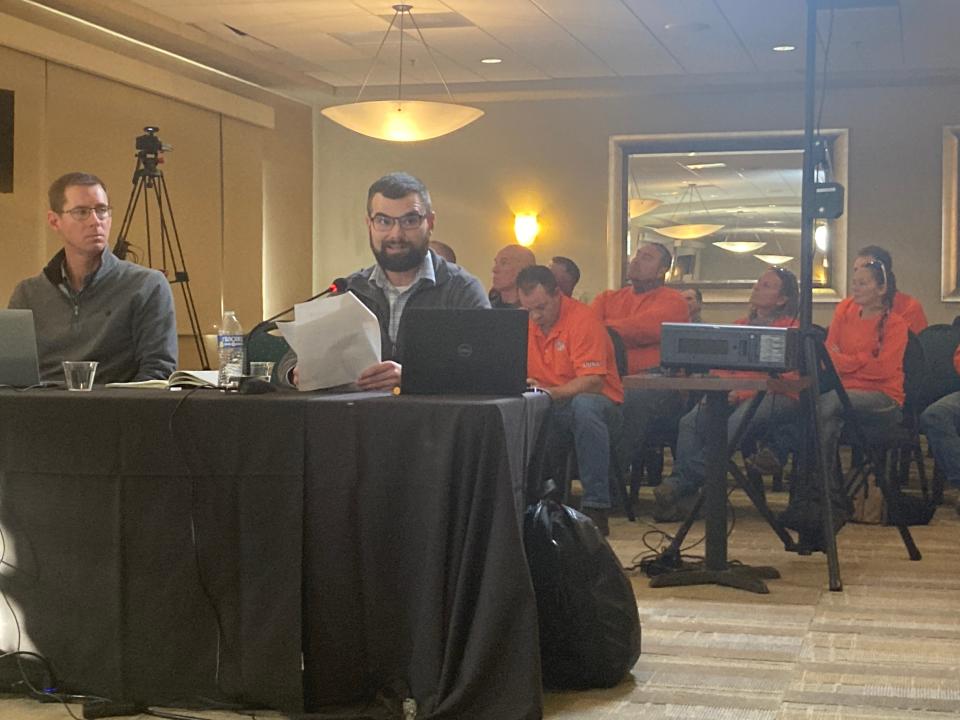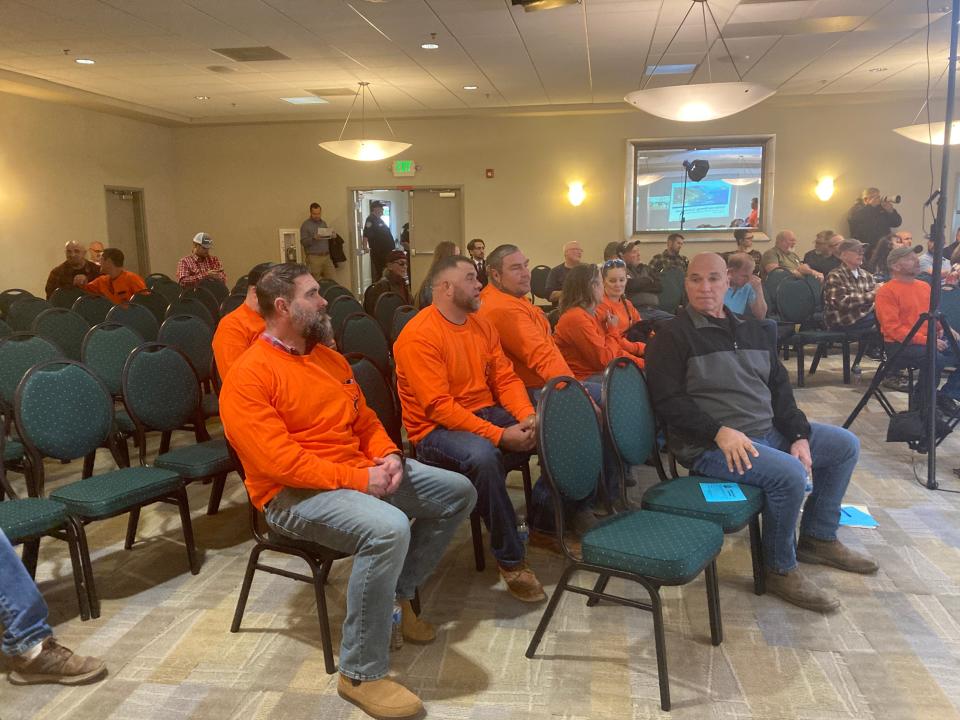Shasta County and Pit River tribe sue California over wind project. Three takeaways.
Shasta County is taking its fight to the courts to stop a controversial wind energy project that it rejected two years ago, but has revived with the help of a new state law.
At a public meeting Tuesday in Anderson that was hosted by the California Energy Commission (CEC), Assistant County Counsel Matthew McOmber said the county is partnering with the Pit River Tribe to sue the commission.
McOmber made the announcement during the meeting’s public comment period.
In an emailed statement to the Record Searchlight after the meeting, McOmber wrote, “The lawsuit alleges that the CEC does not have authority to consider or approve the Fountain Wind Project and demands that the Court require that the CEC cease any and all action related to Fountain Wind’s Project due to lack of jurisdiction.”
The lawsuit was filed Tuesday in Shasta County Superior Court. Best Best & Krieger of Riverside is representing the county.
A settlement conference is scheduled for Aug. 26, 2024. The civil suit is set to go to trial on Oct. 29, 2024.
Both the settlement conference and trial date could come after the CEC renders a decision on the project.

Texas-based ConnectGen wants to build up to 48 wind turbines on 4,500 acres in the Montgomery Creek-Round Mountain area, which is about 35 miles east of Redding. According to the company's website, the turbines would have the capacity to generate about 200 megawatts, enough to power about 80,000 homes.
New legislation, AB 205, that took effect in the summer of 2022 allows the California Energy Commission to consider approving the project. That means the state could overrule Shasta County's decision and approve the Fountain Wind project.
Tuesday’s meeting drew about 100 people and lasted roughly six hours at the Gaia Hotel in Anderson. Fifty-eight people spoke during the public comment period. The CEC also has received about 200 written comments to date in opposition and support of the project.
Another public meeting will take place in Shasta County after the project’s draft environmental impact report is published in late March. The EIR is expected to be finished in June and the project could come before the CEC for a final decision in late July. That meeting would take place in Sacramento.
Here are three takeaways from Tuesday’s meeting.
What the lawsuit alleges
The lawsuit echoes what residents, organizations and several members of the Pit River tribe told the CEC at Tuesday’s meeting, that the massive wind farm is not wanted in eastern Shasta County because of wildfire risk and the negative impacts it would have on cultural and tribal resources, tourism, the watershed, and mental and physical health.
Many residents who spoke Tuesday did so in an incredulous tone, wondering why the meeting is even happening after the project was turned down by the Shasta County Planning Commission and Board of Supervisors.
“We’re afraid that the need for renewable energy is going to win over the safety of the residents of the area,” John Gable, who owns a cabin in Moose Camp near the project site, told the Record Searchlight during a break in the meeting.

Both Shasta County Supervisors Patrick Jones and Mary Rickert addressed the CEC on Tuesday and told commissioners that they represent county residents, while the CEC does not. At the June 2021 Planning Commission meeting and October 2021 Board of Supervisors meeting, residents also made it clear they were against the project, the supervisors said.
The project site lies in Rickert’s district.
The lawsuit states that, “In effect, the application over which the Commission is now asserting jurisdiction is nothing more than an attempt to get a second bite at the apple to illegally overturn the County’s action without judicial review and in violation of the plain language of AB 205 and California constitutional separation of powers principles."
The lawsuit alleges that without judicial determination in this case, the CEC is reviewing the project, which is a waste of public time and resources over a project where the state has no jurisdiction. What the state is doing is usurping the county’s authority and judicial authority on a project that the county spent five years reviewing before rejecting it, the lawsuit says.
"AB 205 was not intended to, and does not, confer jurisdictional authority over a project that was reviewed in its entirety under a local agency’s discretionary review authority and CEQA and was subsequently denied by the local agency," the lawsuit says.
CEC spokeswoman Lyndsay Buckley said it’s the commission’s policy not to comment on pending litigation.
Tribal members speak out
Members of the Pit River tribe on Tuesday told the CEC that any claim that the tribe is working with ConnectGen to mitigate the wind energy project is not true.
The tribe told commissioners that the project would be built within sensitive tribal cultural sites. Moreover, the tribe was never consulted about AB 205 before it became law, tribal representatives said.
“This project is not green or clean and can never offset its carbon footprint,” said Brandy McDaniels, a member of the Pit River Madesi Band.
She called Fountain Wind a “fake green energy project” and said she is upset the Pit River name continues to be used to confuse the public that the tribe supports the wind farm or is working with ConnectGen.
“All the people that live in the area, they don’t want it. So why do you come again?” said Louise Davis, a member of the Pit River Itsatawi Band.

Project much needed in California
Henry Woltag, director of development for ConnectGen, said there are no projects like this left in California.
“Fountain Wind, being one of the few remaining wind projects, is a well-studied project and a well-sighted one,” Woltag said.
He said Fountain Wind would be located in an area that's ideal for generating wind energy, with its access to an existing power system that has enough capacity to “deliver additional energy to the grid” and a compatible land use, “such as commercial timber operations.”
“Well-sighted projects like Fountain Wind are critically needed in order for California to meet its carbon reduction goals,” Woltag said.
Woltag said ConnectGen would be making a $350 million investment in Shasta County to build Fountain Wind.
The project would create 200 union contracting jobs, provide $50 million in property tax revenue to the county and provide $3.5 million in sales tax revenue, Woltag said.

Doyle Radford Jr., business manager for Laborers Local 185, told the Record Searchlight that Fountain Wind would be a responsible project that would provide good-paying jobs to local union workers.
“A lot of our members travel several counties away” to work, he said. “These would be local jobs. They’re committed to building it with good wages, good local jobs. At the end of the day, that’s what we want to see, responsible development with good middle-class jobs for our members.”
In a written comment to the CEC, Redding resident Stephanie Anderson wrote that while she respects the Pit River tribe, "However, I believe this project and others like it are necessary pieces of infrastructure. The public benefits from each investment in our energy grid, and our investments should be green and sustainable. Skilled and trained workers can mitigate damage to the environment during installation."
David Benda covers business, development and anything else that comes up for the USA TODAY Network in Redding. He also writes the weekly "Buzz on the Street" column. He’s part of a team of dedicated reporters that investigate wrongdoing, cover breaking news and tell other stories about your community. Reach him on X, formerly Twitter @DavidBenda_RS or by phone at 1-530-338-8323. To support and sustain this work, please subscribe today.
This article originally appeared on Redding Record Searchlight: Why Shasta County, tribe are suing California over wind project

